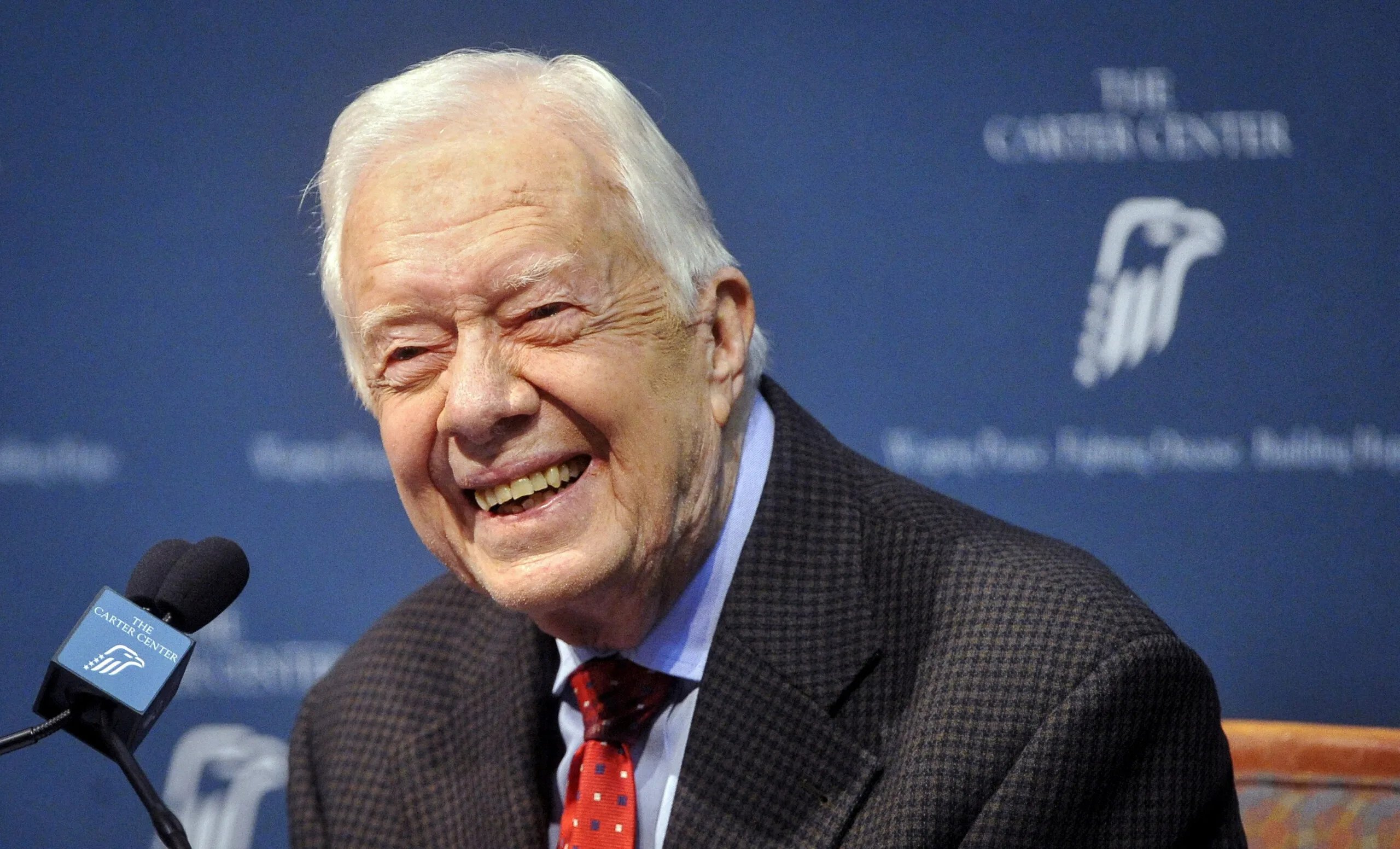
Jimmy Carter, the 39th President of the United States, is a remarkable figure in American history. His presidency, which took place from 1977 to 1981, was marked by a number of significant events and policies, including the Camp David Accords, the Iran hostage crisis, and the establishment of the Department of Education. Beyond his political career, Carter has proven himself to be a passionate advocate for human rights and a tireless humanitarian. In this article, we will delve into 48 intriguing facts about Jimmy Carter, ranging from his early life and upbringing to his post-presidential endeavors. Whether you are a history buff, a political aficionado, or simply curious about this iconic figure, join us as we explore the fascinating life of Jimmy Carter.
Key Takeaways:
- Jimmy Carter, the 39th President of the United States, was a peanut farmer, a Nobel Peace Prize winner, and a dedicated advocate for affordable housing and global peace.
- From negotiating peace agreements to promoting renewable energy, Jimmy Carter’s legacy as a humanitarian leader and statesman continues to inspire and make a lasting impact on the world.
Early Life
Jimmy Carter was born on October 1, 1924, in Plains, Georgia, in a small farmhouse.
Peanut Farmer
Prior to his political career, Carter was a successful peanut farmer, which earned him the nickname “The Peanut Farmer President.
Naval Academy Graduate
Carter attended the United States Naval Academy, where he graduated in 1946.
Nuclear Submariner
During his naval career, Carter served as a submariner on a nuclear submarine, the USS Pomfret.
Ancestry
Carter’s ancestry can be traced back to English and Scottish roots, with his family settling in America in the 17th century.
Sunday School Teacher
Throughout his life, Carter has been actively involved in teaching Sunday school and still continues to teach to this day.
Work with Habitat for Humanity
One of Carter’s most notable post-presidential activities is his work with Habitat for Humanity, a non-profit organization focused on providing affordable housing to those in need.
Nobel Peace Prize
In 2002, Carter was awarded the Nobel Peace Prize for his efforts in finding peaceful solutions to international conflicts and promoting democracy and human rights.
Camp David Accords
During his presidency, Carter played a crucial role in negotiating the Camp David Accords, a peace agreement between Israel and Egypt.
Solar Panels on the White House
In an effort to promote renewable energy, Carter installed solar panels on the roof of the White House. However, they were later removed by President Ronald Reagan.
The Iran Hostage Crisis
One of the most challenging events during Carter’s presidency was the Iran Hostage Crisis, which lasted from 1979 to 1981.
Carter Center
Carter and his wife, Rosalynn, founded the Carter Center, a non-profit organization dedicated to advancing human rights and reducing global poverty.
Habitat for Humanity Founder
Building on his passion for affordable housing, Carter co-founded Habitat for Humanity in 1976, an organization that has helped millions of people worldwide.
Peanut Diplomacy
During Carter’s presidency, peanuts became a symbolic element of his diplomatic efforts, often used as a gesture of goodwill.
Post-Presidential Travel
After leaving office, Carter became one of the most well-traveled former presidents, visiting over 150 countries around the world for various humanitarian causes.
Presidential Medal of Freedom
In 1999, Carter was awarded the Presidential Medal of Freedom, the highest civilian honor in the United States.
Carter’s Books
Carter is not only a statesman but also a prolific author, having written numerous books, including memoirs, historical works, and even fiction.
Farm Aid
Carter has been a strong advocate for farmers’ rights and has actively supported Farm Aid, a nonprofit organization aiding family farmers since its inception in 1985.
Carter’s Georgia Roots
Carter’s roots in Georgia extend beyond his birthplace. He served as the governor of Georgia from 1971 to 1975 before becoming President.
Energy Conservation
During his presidency, Carter emphasized the importance of energy conservation and implemented policies to reduce American dependence on foreign oil.
The Georgia Grown Movement
After leaving office, Carter championed the Georgia Grown movement, promoting locally grown products and supporting Georgia farmers.
Carter’s Cancer Diagnosis
In 2015, at the age of 90, Carter announced that he had been diagnosed with cancer. However, through treatment and medical advancements, he entered remission and continued his active lifestyle.
Carter’s Longest Retirement
As of 2021, Carter holds the record for the longest post-presidential retirement in U.S. history, surpassing the previous record held by Herbert Hoover.
Carter’s Literary Legacy
Carter’s book “An Hour Before Daylight: Memories of My Rural Boyhood” provides a detailed account of his childhood experiences growing up in rural Georgia.
Carter’s Humanitarian Efforts
Jimmy Carter and his wife, Rosalynn, have dedicated their lives to humanitarian efforts, often visiting disaster-stricken areas and working on housing projects.
Carter’s Faith
Carter is a devout Christian and has openly discussed how his faith guides his life and actions.
Carter’s Presidential Library
The Jimmy Carter Presidential Library and Museum, located in Atlanta, Georgia, houses documents and exhibits chronicling Carter’s presidency and his post-presidential work.
Carter’s Education
Carter earned a Bachelor of Science degree from the United States Naval Academy and later obtained a Bachelor of Arts degree in economics from Georgia Southwestern College.
Carter’s Military Service
After graduating from the Naval Academy, Carter served in the Navy for seven years, gaining valuable leadership experience.
Affordable Housing Advocate
Throughout his life, Carter has been an advocate for affordable housing, recognizing the importance of access to safe and decent housing for all individuals and families.
The Carter Doctrine
Carter established the Carter Doctrine, which proclaimed the United States’ commitment to protect its interests in the Persian Gulf region.
Carter’s Diplomatic Achievements
In addition to the Camp David Accords, Carter achieved notable diplomatic victories, including the Panama Canal Treaties and the SALT II arms control treaty with the Soviet Union.
Carter’s Health Initiatives
Throughout his presidency and post-presidential life, Carter has been an advocate for global health, supporting initiatives to eradicate diseases such as Guinea worm disease.
The Carter-Mondale Administration
Carter’s vice president was Walter Mondale, who played a prominent role in the administration and later ran for president himself in 1984.
Carter’s Environmental Stewardship
Carter took significant steps to protect the environment during his presidency, creating the Department of Energy and establishing the Superfund to clean up hazardous waste sites.
Carter’s Commitment to Human Rights
Throughout his political career, Carter has been a vocal advocate for human rights, both in the United States and abroad.
The Carter-Mondale Ticket
Carter and Mondale ran together for re-election in 1980 but were defeated by Ronald Reagan and George H.W. Bush.
Carter’s Childhood Influences
Growing up in rural Georgia, Carter learned important values such as hard work, generosity, and the importance of community from his parents.
Carter’s Economic Policies
Carter faced economic challenges during his presidency, implementing policies to fight inflation and promote economic growth.
Carter’s Southern Accent
Carter’s distinct Southern accent became a recognizable part of his public persona both during and after his presidency.
Carter’s Family Life
Carter and Rosalynn have been married for over 70 years, and they have four children together – three sons and one daughter.
Carter’s Philanthropy
Even after leaving office, Carter has been dedicated to philanthropy, using his platform and resources to make a positive impact in various areas.
Carter’s Political Activism
Despite his advancing age, Carter has remained politically active, often speaking out on important issues and endorsing candidates for political office.
Carter’s Music Taste
Carter is known for his eclectic taste in music and has mentioned enjoying artists ranging from Bob Dylan to Willie Nelson.
Carter’s Commitment to Democracy
Throughout his career, Carter has been a passionate advocate for democracy, working tirelessly to promote free and fair elections worldwide.
Carter’s Humanitarian Awards
For his efforts in promoting peace, human rights, and humanitarian causes, Carter has received numerous awards and accolades, including the Gandhi Peace Prize.
Carter’s Mentor
Carter considered longtime politician and fellow Georgian Senator Richard B. Russell Jr. as his mentor and a significant influence on his political career.
Carter’s Legacy
Jimmy Carter’s legacy extends far beyond his time in office, as he continues to inspire and make a difference through his humanitarian work and dedication to improving the lives of others.
In conclusion, these 48 facts about Jimmy Carter provide a glimpse into the remarkable life and achievements of this influential statesman. From his humble beginnings as a peanut farmer to his impactful presidency and ongoing dedication to humanitarian causes, Carter’s story is one of resilience, compassion, and leadership. The 48 Facts about Jimmy Carter encapsulate the extraordinary journey of a man who has left an indelible mark on American history and the world.
Conclusion
In conclusion, Jimmy Carter is a fascinating individual who has left a significant impact on American history and beyond. From his humble beginnings in Plains, Georgia, to becoming the 39th President of the United States, Carter’s life has been filled with achievements, challenges, and notable moments.As a devoted advocate for human rights, Carter’s efforts to promote peace, democracy, and social justice have earned him numerous accolades and recognition throughout his lifetime. From his pivotal role in brokering the Camp David Accords to his tireless work with Habitat for Humanity, Carter continues to champion causes that aim to uplift communities and create positive change.With his remarkable intellect, compassionate nature, and unwavering dedication to public service, Jimmy Carter has exemplified what it means to be a true leader and a formidable force for good. His legacy serves as an inspiration to future generations, reminding us of the power of perseverance, integrity, and a commitment to making the world a better place for all.
FAQs
1. What are some notable accomplishments of Jimmy Carter?
Some notable accomplishments of Jimmy Carter include brokering the Camp David Accords, establishing the Department of Energy, and creating the Department of Education.
2. How many terms did Jimmy Carter serve as President?
Jimmy Carter served as the 39th President of the United States from 1977 to 1981, serving a single term.
3. What is Jimmy Carter’s post-presidential work?
After his presidency, Jimmy Carter focused on humanitarian work, including his involvement with Habitat for Humanity and the Carter Center, which promotes human rights and democracy around the world.
4. Where is the Jimmy Carter Presidential Library located?
The Jimmy Carter Presidential Library and Museum is located in Atlanta, Georgia.
5. How old is Jimmy Carter?
As of [current year], Jimmy Carter is [current age].
6. What is Jimmy Carter’s religion?
Jimmy Carter is a devout Baptist, and his faith has played a significant role in his life and political career.
7. Did Jimmy Carter win a Nobel Peace Prize?
Yes, Jimmy Carter was awarded the Nobel Peace Prize in 2002 for his efforts in promoting peace, democracy, and human rights.
8. What is Jimmy Carter’s legacy?
Jimmy Carter’s legacy is one of compassion, diplomacy, and dedication to improving the lives of others. He is often recognized for his commitment to humanitarian causes and his pursuit of peaceful resolutions to conflicts.
9. What is Jimmy Carter’s current health status?
As of [current year], Jimmy Carter has faced health challenges, but he remains resilient and continues to engage in philanthropic work.
10. How can I learn more about Jimmy Carter?
To learn more about Jimmy Carter, you can visit the official website of the Jimmy Carter Presidential Library and Museum or explore various biographies and books written about his life and presidency.
Jimmy Carter's life story captivates with its breadth and depth. From his humble beginnings as a peanut farmer to his transformative presidency and tireless humanitarian work, Carter's journey inspires. His commitment to human rights, diplomacy, and service shines through every chapter of his remarkable life. While exploring the many facets of Jimmy Carter's legacy, consider also delving into the life of his beloved wife and partner, Rosalynn Carter, whose own contributions and influence have left an indelible mark on American history and the world.
Was this page helpful?
Our commitment to delivering trustworthy and engaging content is at the heart of what we do. Each fact on our site is contributed by real users like you, bringing a wealth of diverse insights and information. To ensure the highest standards of accuracy and reliability, our dedicated editors meticulously review each submission. This process guarantees that the facts we share are not only fascinating but also credible. Trust in our commitment to quality and authenticity as you explore and learn with us.


